Kids today have access to a range of music apps designed to spark creativity and encourage learning. Many of these apps can be found on Google Play, emphasizing their accessibility and variety.
These apps introduce children to music in engaging ways, from learning about different instruments to discovering classical music and even new music that expands their tastes.
These tools create a safe and fun environment for kids to listen, play, and explore the world of music.
Key Takeaways
- Safe and engaging music apps for kids cover various genres, from classical to modern songs.
- Many apps offer controls to filter explicit content, making them suitable for kids and the whole family.
- Kids can experiment with playing songs and learning about music theory in a fun, interactive way.
- Apps include music options for every taste, allowing children to read music, play instruments, and learn through sound.
- Parents can find a variety of music apps for kids on Google Play, making it easy to choose the right one for their child’s needs.
Top 13 Music Apps for Kids
Explore these music apps to see which best fits your child’s learning and listening needs.
Each app offers unique features, from teaching kids music basics to letting them discover different instruments and play along with their favorite songs. Many of these top music apps for kids are available for download on Google Play.
1. Spotify Kids
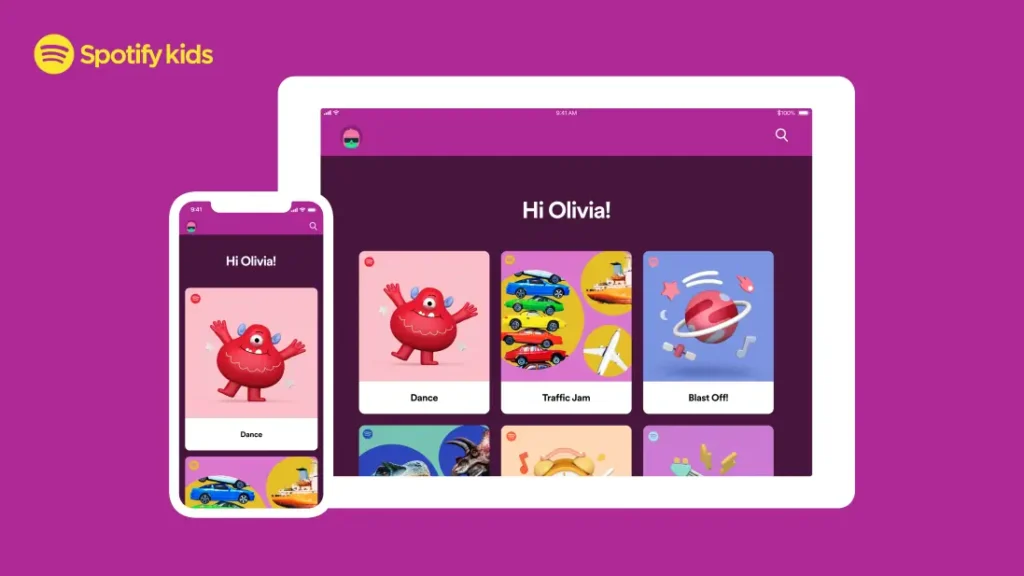
Spotify Kids is a family-friendly platform offering kid-friendly music apps for young listeners. It introduces kids to a vast array of songs, covering genres like classical music and today’s new music.
With age-appropriate playlists, parents can rest assured that children are only exposed to music without inappropriate content.
- Playlists are carefully curated to avoid explicit content, making it safe for kids.
- Great variety, allowing kids to explore both popular and lesser-known songs.
- Limited selection compared to regular Spotify.
- No options for learning about different instruments or reading music.
Pricing: $9.99/month (included in Spotify Premium Family)
Platform: iOS, Android
2. Apple Music
Apple Music offers a vast catalog for all ages, including kids. With playlists like “Disney Hits” and classical music, children can explore various styles.
Parents can create a safe environment for kids by adjusting settings to filter inappropriate or explicit content, keeping family listening worry-free.
- Large library with many kid-friendly playlists.
- Offers control for explicit content, making it suitable for the whole family.
- Subscription required after free trial period.
- Limited interactive features for learning music.
Pricing: $10.99/month (Apple One subscription available)
Platform: iOS, Android, Windows, macOS
3. Baby Mozart
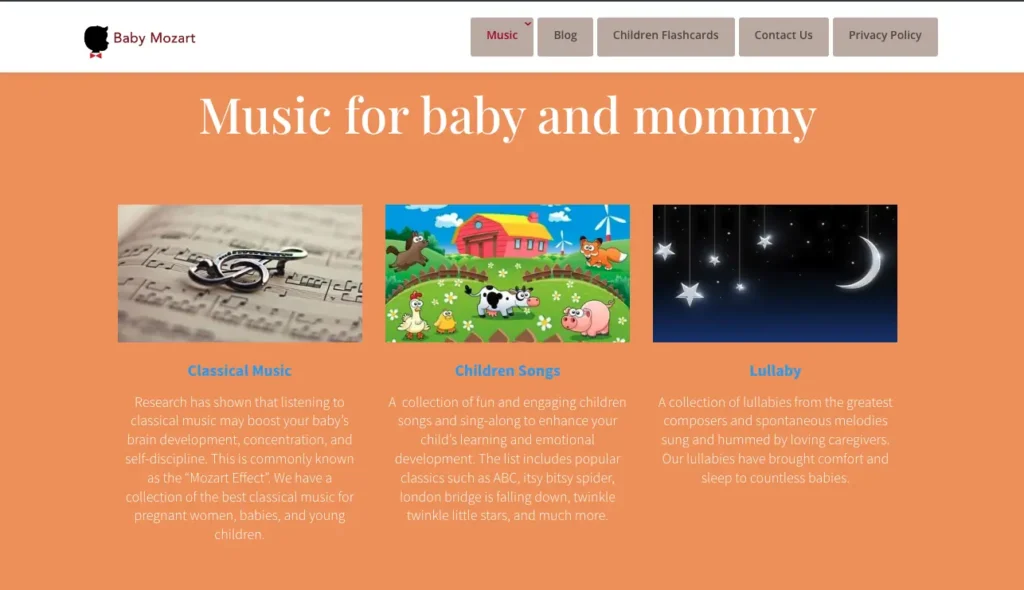
Baby Mozart focuses on exposing toddlers and infants to soothing classical music, including Mozart’s famous compositions.
This app is ideal for young kids and parents looking for a calming experience, introducing babies to music from an early age.
- Gentle music without inappropriate content for young children.
- Focuses on a calming, developmental experience.
- Limited variety outside of classical music.
- Less interactive than other apps designed for older kids.
Pricing: Free with optional in-app purchases
Platform: iOS
4. iHeartRadio Family

iHeartRadio Family provides curated content for kids, including popular songs, classical pieces, and children’s favorites.
With family-friendly playlists and stations, parents and children can enjoy music without worrying about explicit content.
- Music for all ages, making it suitable for family listening.
- Offers a mix of stories, songs, and live radio.
- Live radio format limits song selection.
- Ads may play unless using a premium version.
Pricing: Free, with ads; ad-free available via iHeartRadio Plus ($4.99/month) or iHeartRadio All Access ($9.99/month)
Platform: iOS, Android
5. Sesame Street
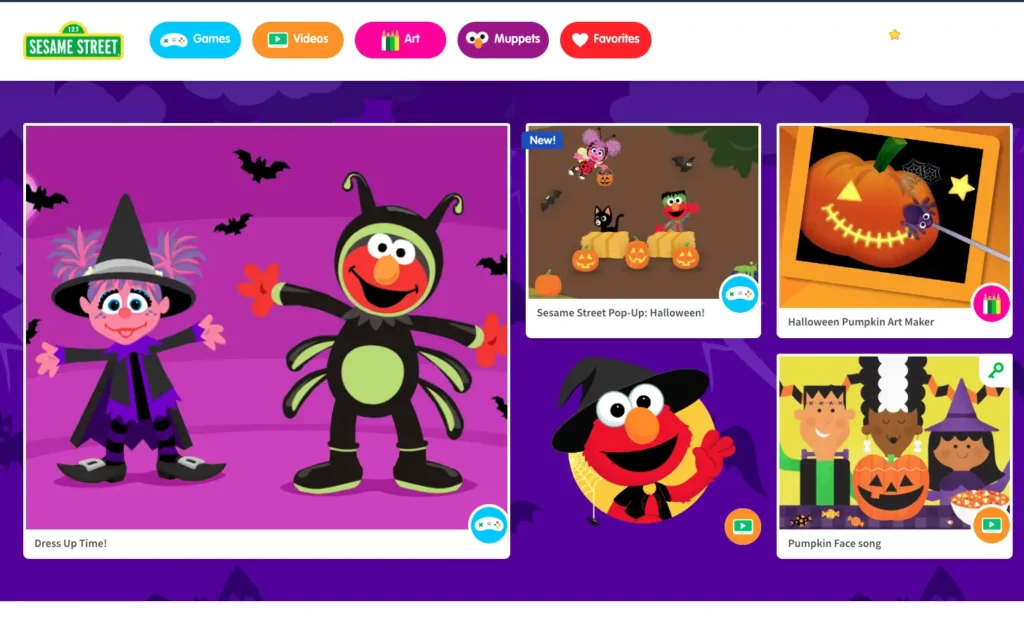
Sesame Street’s music app lets children sing along with well-known characters like Elmo and Big Bird.
Kids can explore songs tailored to their age group, making it both fun and educational. The app also focuses on safe content with no inappropriate songs.
- Educational and entertaining with beloved characters.
- Helps young children learn music basics through familiar tunes.
- Limited to Sesame Street’s song library.
- Focuses on sing-alongs rather than learning different instruments.
Pricing: Free with in-app purchases
Platform: iOS, Android
6. Sago Mini Music Box
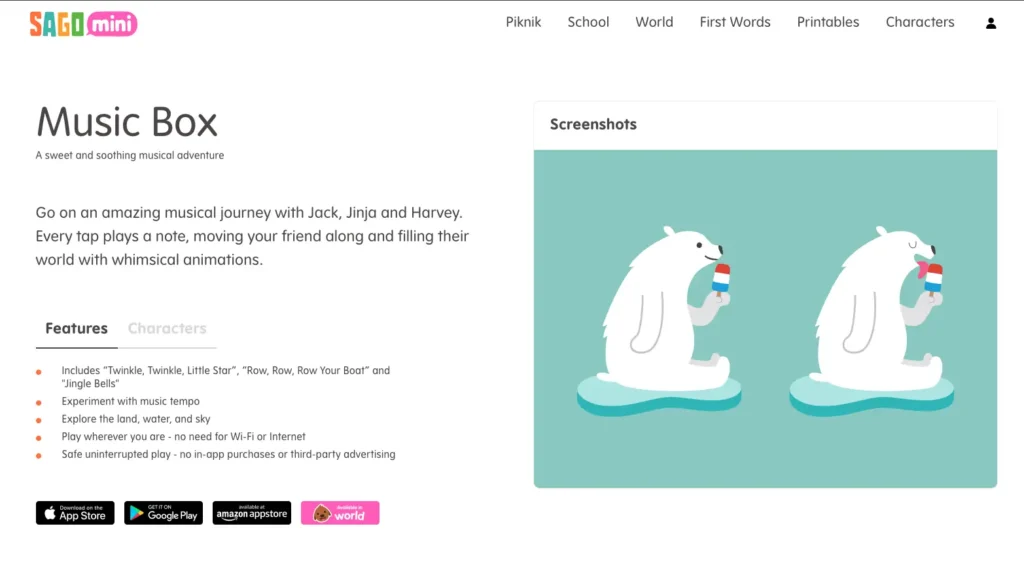
Sago Mini Music Box is a hands-on app that lets young children explore music-making with virtual instruments.
Kids can tap and play along to songs while discovering new sounds, making it a great introduction to music apps for young children.
- Interactive design that promotes hands-on play with music.
- No ads, so it’s safe for toddlers.
- Limited variety of songs.
- Suitable for younger kids but may not engage older children.
Pricing: $3.99 (one-time purchase)
Platform: iOS, Android
7. Kids Music
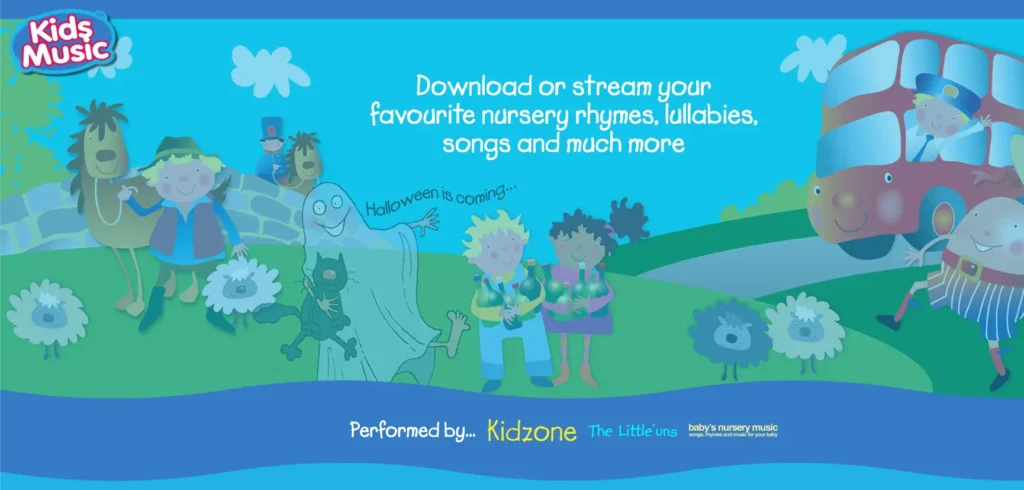
Kids Music combines music and education, introducing children to basic musical elements like rhythm and melody.
Kids can play along with the app to learn new music concepts and practice different instruments.
- Simple, engaging app for learning music fundamentals.
- Colorful design captures kids’ attention.
- Lacks more advanced features for older children.
- Limited selection of songs and instruments.
Pricing: Free with in-app purchases
Platform: iOS, Android
8. YouTube Kids

YouTube Kids provides a safe space for children to explore music videos, educational videos, and songs from around the world.
Parents can monitor content settings to ensure no inappropriate content appears, making it suitable for family viewing.
- Wide variety of music videos and educational content.
- Customizable controls for a safer experience.
- Limited offline access unless downloaded.
- Ads may interrupt unless a premium subscription is purchased.
Pricing: Free; YouTube Premium available for ad-free experience ($13.99/month)
Platform: iOS, Android
9. Mussila Music School

Mussila Music School teaches children about reading music and playing instruments, with lessons on rhythm, notes, and different instruments. It combines structured learning with a playful interface to keep kids engaged.
- Comprehensive music lessons for different skill levels.
- Great for kids interested in learning music theory.
- Requires subscription for full access.
- More structured, so younger children may find it less playful.
Pricing: Free with in-app purchases; subscription starts at $6.99/month
Platform: iOS, Android
10. World Music Adventure
World Music Adventure is an app that allows kids to listen to and learn about music from around the world. Children can explore various music traditions, exposing them to global cultures and a wide range of instruments.
- Educational focus on different world music styles.
- Encourages cultural awareness through music.
- Limited selection of popular Western music.
- Suitable mostly for school-age children and up.
Pricing: Free with optional in-app purchases
Platform: iOS, Android
11. Learn Music

Learn Music offers interactive tutorials for kids to practice reading music and learning instruments. The app covers foundational music skills, including rhythm, note recognition, and the basics of music theory.
- Teaches essential music skills at a self-paced speed.
- Covers basics like reading music and understanding rhythm.
- Subscription needed for complete access.
- Lacks features that appeal to very young children.
Pricing: Free with subscription option ($7.99/month)
Platform: iOS, Android
12. PlayKids
PlayKids combines music and learning with an extensive library of songs and games. The app’s music section is designed to keep children entertained while introducing them to simple musical concepts.
- Safe, ad-free app with parental controls.
- Features other learning content alongside music.
- Limited focus on music compared to other features.
- Subscription required for full content access.
Pricing: $9.99/month
Platform: iOS, Android
13. Toca Dance Free
Toca Dance Free is a music app that lets kids create and perform dance routines to various songs. It offers a creative outlet for children who love both music and dance, allowing them to choreograph routines to their favorite songs.
- Promotes creativity and physical activity.
- No ads, ensuring a safe environment for young users.
- Limited song choices.
- Focuses primarily on dance rather than musical education.
Pricing: Free
Platform: iOS, Android
Benefits of Music Apps for Kids

Music apps can have a profound impact on a child’s cognitive, emotional, and social development. Here are some benefits of music apps for kids:
- Improved Cognitive Skills: Music apps can help children develop their memory, concentration, and spatial-temporal skills. Engaging with music regularly can enhance their ability to process information and solve problems.
- Enhanced Creativity: These apps encourage children to express themselves creatively through music composition, singing, and playing different instruments. This creative outlet can boost their imagination and innovation.
- Emotional Intelligence: Music apps can help children develop emotional intelligence by teaching them to recognize, understand, and manage their emotions through music. Listening to and creating music can be a powerful way for kids to explore and express their feelings.
- Social Skills: Music apps can help children develop social skills by allowing them to collaborate with others, share their music, and receive feedback. Participating in musical activities can foster teamwork and communication.
- Stress Relief: Music apps provide a healthy outlet for children to manage stress and anxiety. Engaging with music can be a soothing and therapeutic experience, helping kids to relax and unwind.
Choosing the Right Music App
With so many music apps available, it can be overwhelming to choose the right one for your child. Here are some factors to consider:
- Age and Skill Level: Choose an app that is suitable for your child’s age and skill level. Some apps are designed for beginners, while others are more advanced, offering in-depth lessons on reading music and playing different instruments.
- Music Genre: Consider the type of music your child enjoys. Some apps specialize in classical music, while others offer a wide range of genres, from pop to jazz to world music.
- Features: Look for apps that offer features such as interactive lessons, games, and exercises to keep your child engaged. Apps that allow kids to explore different instruments and create their own music can be particularly beneficial.
- Safety: Ensure that the app is safe and secure, with parental controls and monitoring features to protect your child’s online activity. Apps like Spotify Kids and Apple Music offer settings to filter explicit content, making them suitable for family use.
- Reviews: Read reviews from other parents and educators to get a sense of the app’s effectiveness and user experience. Feedback from other users can provide valuable insights into the app’s strengths and weaknesses.
Discovering New Music
Music apps can be a great way for children to discover new music and artists. Here are some ways to encourage your child to explore new music:
- Playlists: Create playlists with a mix of familiar and new music to introduce your child to different genres and artists. This can help broaden their musical tastes and expose them to a variety of sounds.
- Recommendations: Use music apps that offer personalized recommendations based on your child’s listening habits. Apps like Spotify Kids and Apple Music can suggest new music handpicked to match their preferences.
- Radio Stations: Tune into online radio stations that play a variety of music, including new releases and emerging artists. This can be a fun way for kids to discover new music and stay updated with the latest trends.
- Music Festivals: Attend music festivals and concerts with your child to expose them to live music and new artists. Experiencing music in a live setting can be an exciting and inspiring experience for kids.
Age-Specific Music Apps

Different age groups have different needs and preferences when it comes to music apps. Here are some age-specific music apps to consider:
- Toddlers (2-4 years): Apps like Baby Mozart and Sesame Street Makes Music offer simple, interactive music games and nursery rhymes. These apps are designed to be engaging and educational for the youngest music lovers.
- Preschoolers (5-6 years): Apps like ABC Music and iTooch Music introduce basic music concepts, such as rhythm and melody, through games and exercises. These apps are perfect for kids who are just starting to explore the world of music.
- School-age Children (7-12 years): Apps like Piano Maestro and Yousician offer more advanced music lessons and exercises. These apps are ideal for children who are ready to dive deeper into music theory and practice playing different instruments.
- Teenagers (13+ years): Apps like GarageBand and Soundtrap allow teens to create and share their own music. These apps provide powerful tools for music production, enabling teenagers to compose, record, and produce their own tracks.
Tips for Parents
Here are some tips for parents to get the most out of music apps for their children:
- Set Limits: Establish screen time limits and ensure that your child is using music apps in moderation. Balance screen time with other activities to promote a healthy lifestyle.
- Monitor Progress: Use parental controls and monitoring features to track your child’s progress and adjust the app’s settings as needed. This can help you ensure that your child is using the app safely and effectively.
- Encourage Practice: Encourage your child to practice regularly, even if it’s just for a few minutes a day. Consistent practice can help them develop their musical skills and build confidence.
- Make It Fun: Make music learning fun by incorporating games, challenges, and rewards into the learning process. Celebrate your child’s achievements and encourage them to explore their musical interests.
- Be Involved: Be involved in your child’s music learning by listening to their music, attending concerts, and providing feedback and support. Your involvement can make a big difference in their musical journey and help them stay motivated.
By following these tips and choosing the right music apps, you can help your child develop a lifelong love of music and enjoy the many benefits that come with it.
Conclusion
These music apps offer a world of opportunities for kids to listen, learn, and play with music. From discovering classical music and reading notes to exploring different instruments, each app caters to specific interests and age groups.
With options that include parental controls to block explicit content, these apps make it easy for the whole family to enjoy a safe and educational music experience.
FAQs
1) Which music app is best for toddlers?
For toddlers, apps like Baby Mozart and Sago Mini Music Box offer safe, engaging music experiences without ads.
2) Can kids learn to play instruments using these apps?
Yes, apps such as Mussila Music School and Learn Music provide tutorials for learning instruments and reading music.
3) Are these music apps free?
While some apps have free options, others require subscriptions for full access, such as Apple Music and PlayKids.
4) Is there an app that allows kids to listen to songs without inappropriate content?
Spotify Kids, Apple Music (with controls), and iHeartRadio Family provide content that filters out inappropriate songs for safe listening



